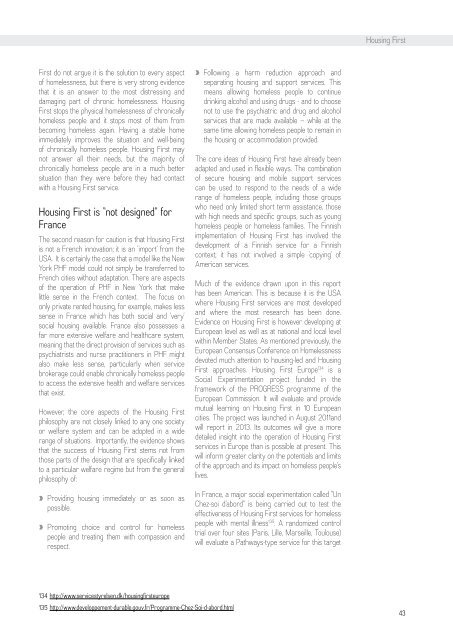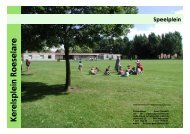Housing First - Provincie West-Vlaanderen
Housing First - Provincie West-Vlaanderen
Housing First - Provincie West-Vlaanderen
You also want an ePaper? Increase the reach of your titles
YUMPU automatically turns print PDFs into web optimized ePapers that Google loves.
<strong>Housing</strong> <strong>First</strong><strong>First</strong> do not argue it is the solution to every aspectof homelessness, but there is very strong evidencethat it is an answer to the most distressing anddamaging part of chronic homelessness. <strong>Housing</strong><strong>First</strong> stops the physical homelessness of chronicallyhomeless people and it stops most of them frombecoming homeless again. Having a stable homeimmediately improves the situation and well-beingof chronically homeless people. <strong>Housing</strong> <strong>First</strong> maynot answer all their needs, but the majority ofchronically homeless people are in a much bettersituation than they were before they had contactwith a <strong>Housing</strong> <strong>First</strong> service.<strong>Housing</strong> <strong>First</strong> is “not designed” forFranceThe second reason for caution is that <strong>Housing</strong> <strong>First</strong>is not a French innovation; it is an ‘import’ from theUSA. It is certainly the case that a model like the NewYork PHF model could not simply be transferred toFrench cities without adaptation. There are aspectsof the operation of PHF in New York that makelittle sense in the French context. The focus ononly private rented housing, for example, makes lesssense in France which has both social and ‘very’social housing available. France also possesses afar more extensive welfare and healthcare system,meaning that the direct provision of services such aspsychiatrists and nurse practitioners in PHF mightalso make less sense, particularly when servicebrokerage could enable chronically homeless peopleto access the extensive health and welfare servicesthat exist.However, the core aspects of the <strong>Housing</strong> <strong>First</strong>philosophy are not closely linked to any one societyor welfare system and can be adopted in a widerange of situations. Importantly, the evidence showsthat the success of <strong>Housing</strong> <strong>First</strong> stems not fromthose parts of the design that are specifically linkedto a particular welfare regime but from the generalphilosophy of:❱❱Providing housing immediately or as soon aspossible.❱❱Promoting choice and control for homelesspeople and treating them with compassion andrespect.❱❱Following a harm reduction approach andseparating housing and support services. Thismeans allowing homeless people to continuedrinking alcohol and using drugs - and to choosenot to use the psychiatric and drug and alcoholservices that are made available – while at thesame time allowing homeless people to remain inthe housing or accommodation provided.The core ideas of <strong>Housing</strong> <strong>First</strong> have already beenadapted and used in flexible ways. The combinationof secure housing and mobile support servicescan be used to respond to the needs of a widerange of homeless people, including those groupswho need only limited short term assistance, thosewith high needs and specific groups, such as younghomeless people or homeless families. The Finnishimplementation of <strong>Housing</strong> <strong>First</strong> has involved thedevelopment of a Finnish service for a Finnishcontext; it has not involved a simple ‘copying’ ofAmerican services.Much of the evidence drawn upon in this reporthas been American. This is because it is the USAwhere <strong>Housing</strong> <strong>First</strong> services are most developedand where the most research has been done.Evidence on <strong>Housing</strong> <strong>First</strong> is however developing atEuropean level as well as at national and local levelwithin Member States. As mentioned previously, theEuropean Consensus Conference on Homelessnessdevoted much attention to housing-led and <strong>Housing</strong><strong>First</strong> approaches. <strong>Housing</strong> <strong>First</strong> Europe 134 is aSocial Experimentation project funded in theframework of the PROGRESS programme of theEuropean Commission. It will evaluate and providemutual learning on <strong>Housing</strong> <strong>First</strong> in 10 Europeancities. The project was launched in August 2011andwill report in 2013. Its outcomes will give a moredetailed insight into the operation of <strong>Housing</strong> <strong>First</strong>services in Europe than is possible at present. Thiswill inform greater clarity on the potentials and limitsof the approach and its impact on homeless people’slives.In France, a major social experimentation called “UnChez-soi d’abord” is being carried out to test theeffectiveness of <strong>Housing</strong> <strong>First</strong> services for homelesspeople with mental illness 135 . A randomized controltrial over four sites (Paris, Lille, Marseille, Toulouse)will evaluate a Pathways-type service for this target134 http://www.servicestyrelsen.dk/housingfirsteurope135 http://www.developpement-durable.gouv.fr/Programme-Chez-Soi-d-abord.html43
















